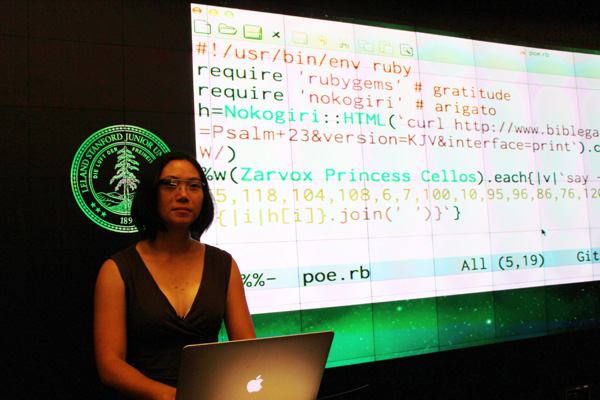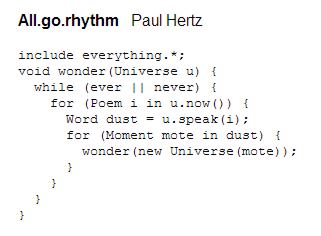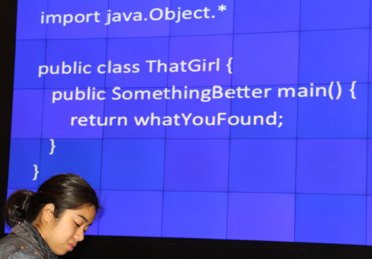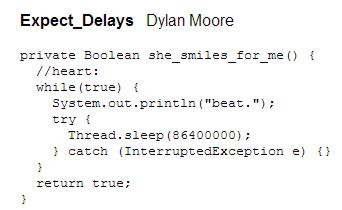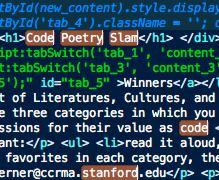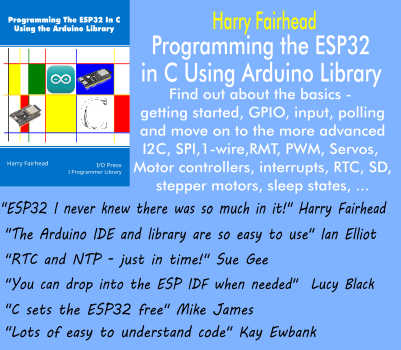| Writing Code As Poetry; Poetry As Code |
| Written by David Conrad | |||
| Sunday, 05 January 2014 | |||
|
A high-tech poetry competition that explores how computer code can be read as poetic language is now accepting submissions for its Winter 2014 event. The inaugural Code Poetry Slam, sponsored by Stanford University's Division of Literatures, Cultures, and Languages, was held during November 2013 and following its success its organizers are already looking for more code poems for the next one. So what is a Code Poem? According to Melissa Kagan one of the organizers of the event: "Code poetry can mean a lot of different things depending on whom you ask. It can be a piece of text that can be read as code and run as program, but also read as poetry. It can mean a human language poetry that has mathematical elements and codes in it, or even code that aims for elegant expression within severe constraints, like a haiku or a sonnet, or code that generates automatic poetry. Poems that are readable to humans and readable to computers perform a kind of cyborg double coding." Entrant for forthcoming Slams now have benefit of being able to see the entries that were selected as the finalists of previous slams. Code Poetry Slam 1.0 was won by Leslie Wu, a doctoral student in Computer Science at Stanford. Wu’s entry was a poem written in Ruby called 'Say 23,' in which she typed 16 lines of code that she simultaneously recited aloud. The code was also projected onto a screen via Google Glass worn by Wu. Once she stopped speaking and ran the script, output in the form of a stream of words from Psalm 23 were read out loud three times, each one in a different pre-recorded-computer voice.
Wu noted that when she was typing the code most people didn't know what she was doing: "They were probably confused and curious. But when I executed the poem, the program interpreted the code and they could hear words it gave voice to the code." Co-organizer of the competition Kurt James Werner, a graduate student in computer-based music theory and acoustics commented: "Wu's poem incorporated a lot of different concepts, languages and tools. It had Ruby language, Japanese and English, was short, compact and elegant. It did a lot for a little code." All.go.rhythm by Paul Hertz, one of the runners up is a poem that looks elegant, suggesting that the judges were looking at the form of the code itself:
Another runner up Ian Holmes produced this Haiku:
This entry is one that struck a chord with me:
Having attracted a lot of interest the competition is now planned to be a quarterly event and the deadline for online submissions from Stanford and beyond to the next one is February 12th. Melissa Kagen says: "What we are interested is in the poetic aspect of code used as language to program a computer." and this does seen to be a good opportunity to look for art within technology.
More InformationFinalists of Code Poetry Slam 1.0 Related Articles
To be informed about new articles on I Programmer, install the I Programmer Toolbar, subscribe to the RSS feed, follow us on, Twitter, Facebook, Google+ or Linkedin, or sign up for our weekly newsletter.
Comments
or email your comment to: comments@i-programmer.info
|
|||
| Last Updated ( Sunday, 05 January 2014 ) |
